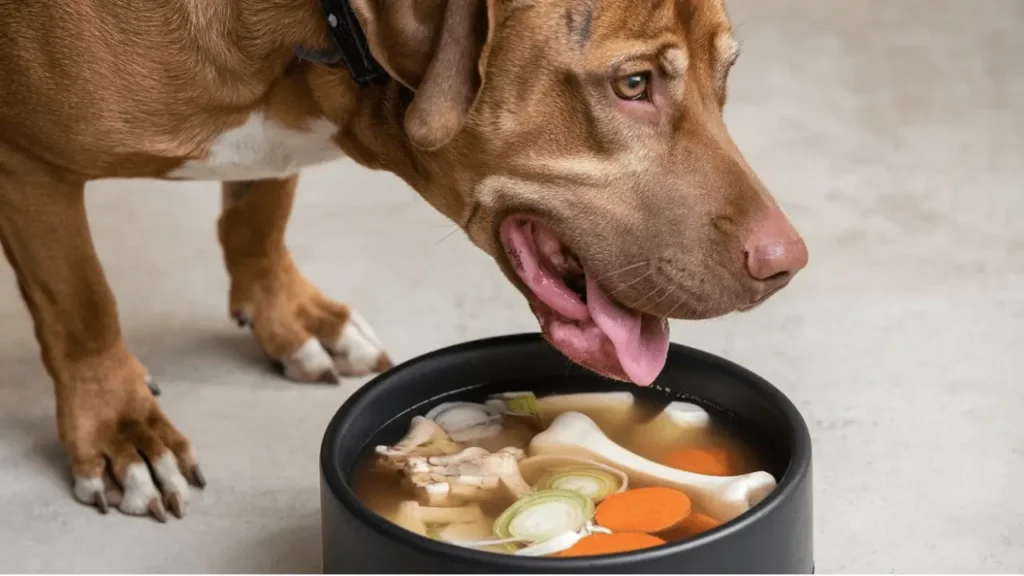Bone Broth for Dogs: Benefits, Recipe & Feeding Guide
Table of Contents
- Introduction
- What is Bone Broth for Dogs?
- Nutritional Benefits of Bone Broth for Dogs
- 3.1. Supports Joint Health
- 3.2. Improves Digestion and Gut Health
- 3.3. Enhances Immune Function
- 3.4. Hydration and Skin Health
- How to Make Bone Broth for Dogs
- 4.1. Ingredients
- 4.2. Step-by-Step Instructions
- Risks and Considerations When Feeding Bone Broth to Dogs
- 5.1. High Sodium Content
- 5.2. Harmful Additives in Store-Bought Versions
- 5.3. Allergic Reactions
- Store-Bought vs. Homemade Bone Broth for Dogs
- FAQs
- 7.1. Can Bone Broth Replace Regular Meals for Dogs?
- 7.2. Is Bone Broth Safe for Puppies?
- 7.3. How Much Bone Broth Should I Give My Dog?
- Conclusion
1. Introduction
Bone broth for dogs is becoming a popular addition to their diet, offering various health benefits such as supporting joint health, digestion, and hydration.
Before making bone broth a staple in your dog’s diet, it’s important to understand the nutritional benefits and potential risks associated with it. In this article, we’ll guide you through everything you need to know about bone broth for dogs.
For a broader understanding of your dog’s dietary needs, check out our guide on healthy dog diets.

2. What is Bone Broth for Dogs?
Bone broth is made by simmering animal bones in water over an extended period. This process extracts valuable nutrients like collagen, gelatin, and essential minerals, which are incredibly beneficial for your dog’s health.
Why Bone Broth Works for Dogs:
- Collagen and Gelatin: Essential for supporting joint health, collagen provides the building blocks for cartilage, while gelatin can reduce inflammation.
- Amino Acids: These are critical for immune function and tissue repair.
- Minerals: Important for maintaining bone strength, dental health, and overall vitality.
You can make bone broth at home using chicken, beef, or turkey bones, ensuring the inclusion of safe and natural ingredients for your dog. To make sure your dog’s food is well-balanced, check out our guide on selecting the right dog food.
3. Nutritional Benefits of Bone Broth for Dogs
Bone broth provides numerous nutritional benefits that can support your dog’s health. Here are the top advantages:
3.1. Supports Joint Health
Bone broth is a rich source of collagen, which helps in the formation of cartilage—the cushion that protects joints. Additionally, the gelatin found in bone broth has anti-inflammatory properties that can help ease arthritis symptoms and support joint mobility.
For more on supporting your dog’s joint health, check out our article on joint health for dogs.
3.2. Improves Digestion and Gut Health
Bone broth contains gelatin, which helps repair the intestinal lining and promote the growth of healthy gut bacteria. This can be particularly beneficial for dogs with sensitive stomachs, digestive issues, or those recovering from gastrointestinal upset.
3.3. Enhances Immune Function
Bone broth is packed with amino acids, such as glycine and proline, that help boost your dog’s immune system. These amino acids support cellular function and protect against illness, making bone broth an excellent natural supplement for improving your dog’s overall immune health.
If you want to enhance your dog’s immune function, check out our tips on boosting dog immunity.
3.4. Hydration and Skin Health
Bone broth is a fantastic source of hydration, especially for dogs who are reluctant drinkers. The flavor and nutrients encourage your dog to drink more water, promoting better hydration for skin, kidney function, and overall health.
4. How to Make Bone Broth for Dogs
Making bone broth at home is simple, and it ensures you know exactly what your dog is consuming. Here’s how to do it:
4.1. Ingredients
- 2–3 pounds of bones (chicken, beef, turkey)
- Water
- 2 tbsp apple cider vinegar (helps break down the bones)
- Optional: Dog-safe herbs like parsley (avoid garlic and onions)
4.2. Step-by-Step Instructions
- Prepare the Bones: Place the bones in a large pot.
- Cover with Water: Fill the pot with enough water to cover the bones.
- Add Vinegar: Add 2 tablespoons of apple cider vinegar to help extract minerals.
- Simmer: Bring the water to a boil and then reduce to a simmer for 12–24 hours.
- Strain and Cool: Once done, strain the bones and allow the broth to cool.
You can store the broth in the fridge for up to a week or freeze it for long-term use.
5. Risks and Considerations When Feeding Bone Broth to Dogs
Although bone broth is a nutritious option for dogs, there are some important risks and considerations to keep in mind:
5.1. High Sodium Content
If you purchase store-bought bone broth, be mindful of the sodium content. High sodium levels can be harmful to dogs, leading to issues like high blood pressure and kidney problems. Always check the labels for sodium levels and avoid broths with added salt.
5.2. Harmful Additives in Store-Bought Versions
Many commercially available broths contain harmful ingredients like onions, garlic, or preservatives, which are toxic to dogs. When purchasing bone broth, always ensure that it’s free from these substances.
5.3. Allergic Reactions
Although rare, some dogs may have allergies to certain ingredients in bone broth. If you notice symptoms like vomiting, diarrhea, or skin rashes, discontinue use and consult your veterinarian.
6. Store-Bought vs. Homemade Bone Broth for Dogs
Making bone broth at home allows you to control the ingredients, ensuring your dog gets the healthiest option. Homemade bone broth is free from preservatives and harmful chemicals. However, there are high-quality store-bought options available, provided you check the ingredients list for safety.
If you’re looking for pre-made options, explore our guide on selecting healthy dog food products.
7. FAQs
7.1. Can Bone Broth Replace Regular Meals for Dogs?
No, bone broth should be used as a supplement, not a substitute for a balanced meal. It’s meant to enhance your dog’s diet by adding extra nutrients.
7.2. Is Bone Broth Safe for Puppies?
Yes, bone broth can be safe for puppies, especially when introduced in moderation. It can provide beneficial nutrients for their developing joints and digestive system.
7.3. How Much Bone Broth Should I Give My Dog?
The general serving guideline is:
- Small Dogs: 1-2 tablespoons per day
- Medium Dogs: 1/4 to 1/2 cup per day
- Large Dogs: 1/2 cup to 1 cup per day
8. Conclusion
Bone broth is a nutrient-packed supplement that can support your dog’s overall health in multiple ways, from improving joint health and digestion to boosting immunity and hydration. Whether you make it at home or purchase it from a trusted brand, bone broth is a great addition to your dog’s diet when used in moderation.
For more helpful tips on feeding your dog the best diet, visit our dog diet guide.

